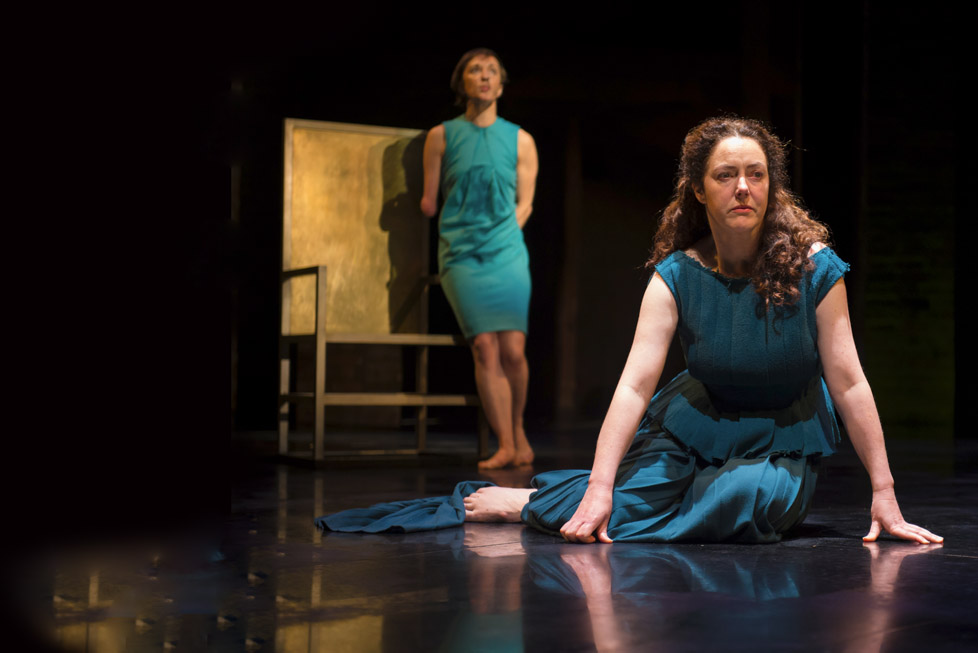In this latest telling of a 3,000-year-old story about the fall of Troy, Marina Carr has amplified the woman’s perspective during times of testosterone fuelled slaughter and mayhem. Her Hecuba stands witness to the worst men can do when released from law and drunk on violence. From a bottomless pit of despair she presents a hauntingly simple but unarguable truth: “Society cannot run if women are unhappy.” Carr has found, within Agamemnon’s ‘shock and awe’ subjugation of the Trojans, parallels with the West’s recent attitude towards the Middle East, and it is this that makes Hecuba, regrettably, a contemporary fable.
Erbhle Crotty as Hecuba and Ray Fearon as Agamemnon bring visceral emotion to a downward spiralling power struggle. We join Hecuba reeling in near disbelief as she sits on her husband’s throne amidst a pile of (imagined) body parts that until moments before were her living, breathing family. Soon she will be holding the severed head of her husband, King Priam, taking dwindling consolation from the belief that her youngest son Polydorus is away and in safe hands, and that her remaining two daughters will find safety in her company.
Can anything possibly get worse? Well, yes. This is war after all. But one in particular where any semblance of etiquette has been drowned in blood. In one of the cruellest scenes imaginable the favourite of her two remaining daughters is selected to be sacrificed in the belief that the gods will provide wind enough for the weary conquering Achaean army to sail home. Agamemnon, who by default must perform the deed, is perfectly compromised by an act he finds little belief in, yet must appease his jittery followers or face overthrow. Fearon’s portrayal of a man both powerful and powerless is masterful, while Crotty’s harrowing duty as a mother, committed to offer her daughter comfort to the point of death, is a terrible trial of nerve uncompromisingly observed.
Fearon’s Agamemnon amply displays the swagger of one who has yet to lose a battle. Carr intricately explores the fault lines, the conflicts, both physical and emotional, between him and Hecuba, his trophy victim. There is sexual chemistry between them – her bearing and intelligence beguiling enough to nullify her advanced years. “Grace so rare it hurts the eyes,” he muses. And he too is so alone in the business of slaughter, long estranged from a wife not seen in ten years. Both their bodies need comfort, snatched relief.
And so we follow poor Hecuba’s appointment with Hell, a fall so great, so quick. Carr has a fine sense of the strange contradictions within the human experience. Her Hecuba describes an almost airy sense of freedom as she learns of her offspring’s deaths, as if the travails of motherhood were drifting away like a scarf in the wind.
Carr liberally uses the device of ‘asides’ within the discourse. Characters switch from their own speech to that of their fellows in the form of quotes, as if read in third person from a book. While always delivered faultlessly, on occasions I felt it had the effect of slightly undermining the power of direct conversation.
There are fine performances from Chu Omambala as the slick operator that is Odysseus, King of Ithaca, and the ill-fated daughters Polyxena, played by Amy McAllister, and Cassandra by Nadia Albina. Some extraordinarily atmospheric singing by Lara Stubbs in her role as Hecuba’s woman Xenia brought an edge to the proceedings, along with the musicians on violin, cello, guitar, keyboards and percussion. A minimal set with the only props a gold-backed seat and a candle were ample enough aids. Carr’s writing, assured direction from Erica Whyman and Crotty and Fearon’s tour- de-force performances were enough to evoke a thunderous ovation at the end. ★★★★★
Simon Bishop 27/09/15


